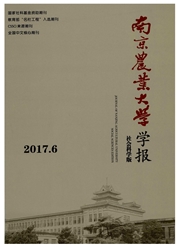

 中文摘要:
中文摘要:
本文采用最为常用的3d_24h膳食回顾法进行膳食调查,利用随机抽取的贵州普定县3个村庄8个自然村的全户调查数据,运用多元Logit模型,旨在分析西南贫困山区农民膳食营养与其健康指标BMI值之间的关系,以便为贫困人群的健康人力资本问题提供实证依据。研究发现:贫困人群的温饱尽管已经能够得到基本保障,但是其营养结构不太合理,蛋白质摄入量普遍不足,膳食质量有待提高;能量摄入量的增加能显著减低体重消瘦的发生率,但是能量摄入量的增加,未对肥胖发生率有显著影响,这从一个侧面说明当地农民膳食水平小于或等于温饱水平;不同年龄群体间、不同性别间体重超轻或超重存在显著差别,需要政府通过一定的营养指导,不断改善农民的膳食结构,使其根据自身生理特点合理膳食,增强体质。
 英文摘要:
英文摘要:
This paper adopts 3d--24h dietary recallable survey to do the research. Households in 8 natural villages of Puding, Guizhou are randomly selected and the multivariate logistic regression is used to analyze the rela- tionship between farmers' dietary nutrition in the southwestern poor mountainous areas and the BMI score, in order to provide empirical evidence in the healthy human capital of the poor people. The research shows that the poor people' basic life problem has almost been solved, but their nutrition structure is not so reasonable, protein intake is insufficient and dietary quality needs to be improved. Increasing energy intake can reduce the incidence of emaciation significantly, and it dose not impact the incidence of obesity. All those prove that local famers' nutrients level is not above the level of food and clothing, and some guidance on the nutrition for the farmers is needed from the government in order to improve the farmers' dietary structure and strengthen their physiques.
 同期刊论文项目
同期刊论文项目
 同项目期刊论文
同项目期刊论文
 National and International Agricultural Research and Rural Poverty: The Case of Rice in India and Ch
National and International Agricultural Research and Rural Poverty: The Case of Rice in India and Ch 期刊信息
期刊信息
